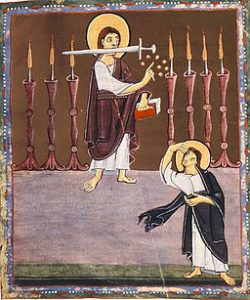 Overview of the Sardis Letter
Overview of the Sardis Letter
The Pergamum and Thyatira churches are struggling to maintain their doctrinal purity in the midst of stumbling blocks from false teachers and the prophetess Jezebel. In spite of the damaging effects of false teaching, Christ notes significant strengths in both churches (2:13, 19). In contrast, the Sardis letter, like the Laodicea letter, contains no words of commendation for the church as a whole. Christ’s most positive note about the Sardis church is that a few of her people have not “defiled their garments” and are “worthy” to receive “white garments” from Jesus when he comes (3:4). Otherwise, she is a “dead” church due to her return to her sins (3:2). She is not prepared for the coming of Jesus, her Savior and Lord. Therefore, Jesus exhorts her to wake up out of her comatose state by repenting and obeying the good teaching that she once received.
Jesus’ Exhortation to the Sardis Church: Be Prepared for My Coming
In Revelation 3:2-3, Jesus’ exhortation to the church turns her attention to his second coming, for which most of her people are not prepared. He says, “Be alert and strengthen the things that remain, which have been about to die, for I have not found your works completed in the sight of my God” (3:2). “Be alert” is the command that Jesus gives to his disciples in his teaching about his second coming (Matt. 24:42-44; 25:13). Since they do not know when he is coming back, they ought always to be on the alert for his coming, which involves always being prepared (Matt. 24:42-25:13). Given her sad state of unpreparedness, Jesus commands the Sardis church to “be alert” in preparation for his coming. Her first step in becoming prepared for his coming is to strengthen the almost dead things that she still has. The conjunction (“for”) connects the final clause to both of the preceding commands. The church needs to be exhorted to “be alert” and to “strengthen” what little she has, because her works do not meet the Father’s (“in the sight of my God”) standard. They are incomplete, or simply not done at all, which means that if Jesus were to return soon, most of the church would face judgment rather than receive the gift of eternal life.
In Revelation 3:3a, Jesus provides three commands that exhort the Sardis church to prepare herself for the Lord’s coming by returning to the works that are pleasing to God. He says, “Therefore, remember how you received and heard, and keep and repent” (3:3a). Jesus turns to the dire consequences that will follow if his commands are not heeded. Revelation 3:3b says, “Therefore, if you might not become alert, I will come like a thief, and you will certainly not know at what hour I will come to you.” The church of Sardis here receives the same warning that Jesus gives to his disciples in Matthew 24:42-44. The language of Revelation 3:3 is so similar that one should probably regard it as an allusion to Matthew 24:42-44.
Sources:
These paragraphs are slightly edited portions of my book:
Paul Hoskins, The Book of Revelation: A Theological and Exegetical Commentary, pp. 100-103 (those pages provide further sources and footnotes that I have omitted above).
